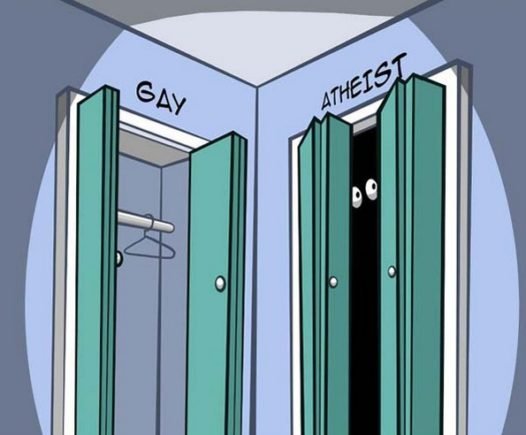
Some equate atheism with being immoral and even amoral. Some of the criticism leveled at nonbelievers comes from the suspicion that those who do not believe in God could not possibly believe in anything else, moral or otherwise. Several years ago, a coworker, upon learning of my agnosticism, said, “So you just believe and do anything you want?” That he had engaged in several extramarital affairs was lost on my hypocritical colleague but not on me.
The notion that atheists and agnostics “do anything they want to do” is not uncommon; however, it is woefully and recklessly ignorant.
Comedian and atheist Penn Jillette says he’s often asked, “Without God, what’s stopping you from raping all you want?” Jillette’s response? “I do rape all I want, and the amount I want is zero.”
The late Christopher Hitchens had a standing offer to name a moral thing that was done in the name of religion that hadn’t been done by an atheist. Morality isn’t the sole provenance of religion, and immoral persons can be found in pews and prisons alike.
….
It is precisely because of these religious prejudices and stereotypes that many agnostics and atheists do not discuss their worldviews in public or even private settings, and if they do, they don’t necessarily tell the truth.
Timur Kuran, in Private Truths, Public Lies: The Social Consequences of Preference Falsification, argues that social pressures can make people say that they want and believe something they really don’t want or believe. Kuran calls this “preference falsification,” a phenomenon that occurs when you make an inaccurate public statement about your actual preferences or beliefs.
“Some of the criticism leveled at nonbelievers comes from the suspicion that those who do not believe in God could not possibly believe in anything else, moral or otherwise.”
….
The same can’t be said for our nation’s and society’s view of atheists and agnostics. In spite of the Obama administration’s passing of the International Religious Freedom Act in 2016, many Americans still do not want atheists teaching their children or marrying them. They would, according to surveys, prefer a female, gay, Mormon or Muslim President to having an atheist in the White House.
To be sure, no closet, neither LGBTQ nor atheist, has ever been padlocked. The choice to come of out of either closet is free and deeply personal. But if the LGBTQ closet is largely empty, the agnostic closet remains, with stigma and stain awaiting anyone who decides to leave it.
Last year, I wrote a book in which I discuss my journey from minister to agnostic and critique popular religious notions like “everything happens for a reason.” I have friends who reviewed my book online, some of whom masked their names to avoid being outed by their association with a controversial topic and agnostic author.
I dream of a day when the atheist closet is empty. When epistemic humility is the intellectual norm and credal dogmatism is the outlier. I envision a world where the burden of proof for an invisible supreme being falls on the believer, not the skeptic. Until then, I hope that the flickering flame of my own religious journey will be a beacon of courage and hope for those cloistered in the last closet.
— David Ramsey, Baptist News Global, Atheism and agnosticism: The last closet, December 15, 2021
Bruce Gerencser, 68, lives in rural Northwest Ohio with his wife of 47 years. He and his wife have six grown children and sixteen grandchildren. Bruce pastored Evangelical churches for twenty-five years in Ohio, Texas, and Michigan. Bruce left the ministry in 2005, and in 2008 he left Christianity. Bruce is now a humanist and an atheist.
Your comments are welcome and appreciated. All first-time comments are moderated. Please read the commenting rules before commenting.
You can email Bruce via the Contact Form.
